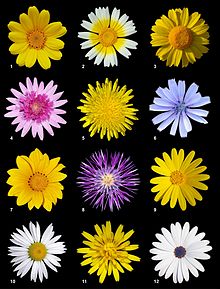Gamopetalae[1] is an artificial historical group used in the identification of plants based on Bentham and Hooker's classification system.

Use by Bentham and Hooker
editGeorge Bentham and Joseph Dalton Hooker published this as Genera plantarum ad exemplaria imprimis in herbariis kewensibus servata definita in three volumes between 1862 and 1883. As a natural system of classification, it does not reflect evolutionary relationships between plants but was a useful and popular system of classification based on a dichotomous key especially for the flowering plant groups (angiosperms). It was based on key characteristics enabling taxonomic students to quickly identify plant groups based only on physical characteristics. However, it is not a scientific group and is used for identification purposes only based on similar plant characteristics. They divided the dicotyledon class into three subclasses;
- Polypetalae (Dicotyledones polypetale)
- Gamopetalae (Dicotyledones gamopetalae)
- Monochlamydeae (Dicotyledones monochlamydeae)
Under that system Gamopetalae is a Sub Class and comprises;
Previous Sub Division
edit- Sub Class 1 Dicotyledons or Exogens
See also
editExternal links
edit- For an illustrated summary of Gamopetalae, see botanic gardens information